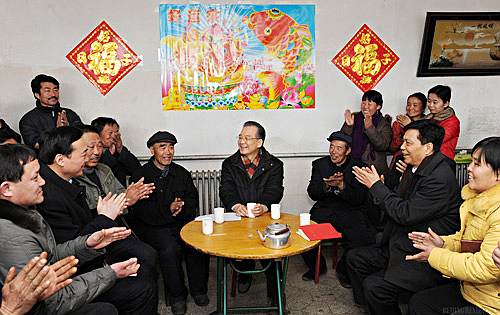|
 |
|
TOWN MEETING: Chinese Premier Wen Jiabao (center) visits residents at a village in Chengde City, Hebei Province, to seek their opinions on the government work report he will deliver at the annual National People's Congress in March (WANG JINGWEN) |
Meeting Dalai Envoys
The Chinese Central Government and representatives of the Dalai Lama held talks recently that continued to reveal "sharply divided" views, said Zhu Weiqun, Executive Vice Minister of the United Front Work Department (UFWD) of the Communist Party of China (CPC) Central Committee, during a State Council Information Office press conference on February 2, 2010.
UFWD head Du Qinglin met in Beijing with the Dalai Lama's private representatives, Lodi Gyari and Kelsang Gyaltsen.
Du pointed out during the meeting that issues concerning China's territory and sovereignty were non-negotiable and no concessions would be made on those issues.
He said so-called "Greater Tibet" and "high-level autonomy" violated China's Constitution and that there could be a foundation for contacts and talks only if the Dalai Lama completely abandoned such claims.
Worst Drought
The Chinese Government has earmarked 50 million yuan ($7.35 million) of emergency funding to help south China fight its worst drought in 50 years, the Ministry of Finance said on January 29.
The money will go to southwestern Yunnan Province and Guangxi Zhuang Autonomous Region to restore agricultural production and to ensure that people and livestock have an adequate supply of drinking water, the ministry said.
The drought has affected 2.9 million people, 1.5 million livestock and 58 percent of crops, or 1.42 million hectares, in Yunnan.
In Guangxi, more than 80,000 people in Donglan County have suffered from a water shortage, local authorities said.
Web Addicted
Chinese youngsters living in less developed cities are more likely to become Internet addicts than their peers in more economically and socially developed regions, a survey released by the Communication University of China on February 2 showed.
The survey found that around 8 percent of young Internet users in major cities like Beijing, Shanghai and Guangzhou are Internet addicts while the proportion can run higher than 20 percent in big cities in the western region. About 24 million young people aged 6 to 29 responded to the survey.
It defined Internet addiction as being present when users display at least one of the following three symptoms—a continuous desire to use the Internet, anxiety or anger when cut off from the Internet or greater happiness when on the Internet than in real life.
Graphic Equality
China's first Atlas of Gender Equality and Women's Development in China was released by the SinoMaps Press on February 1.
The book maps the state of gender equality and women's participation in political affairs, employment, education, marriage, reproductive health and law, said Yu Dongmei, chief editor of the book. It also reveals the geographical differences among Chinese women in such domains as employment, health and diseases, Yu added.
The book, containing more than 70 maps and about 100 statistical tables, is based on research by two Chinese universities since 2007 and is sponsored by the American Ford Foundation.
Drug Crackdown
China seized 91,000 drug trafficking suspects and confiscated 28.8 tons of drugs in 2009, as the country's war on illegal drugs intensified. Police captured 1,559 foreign drug traffickers throughout the year.
Police destroyed 391 drug factories and warehouses, a number that was up 60 percent from the previous year, according to a statement by the Ministry of Public Security on February 1. | 